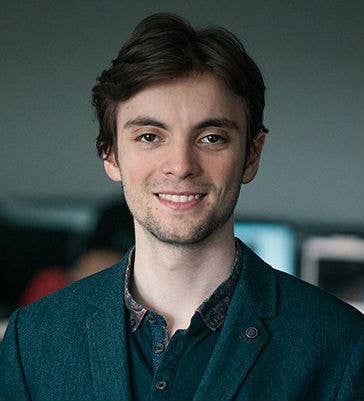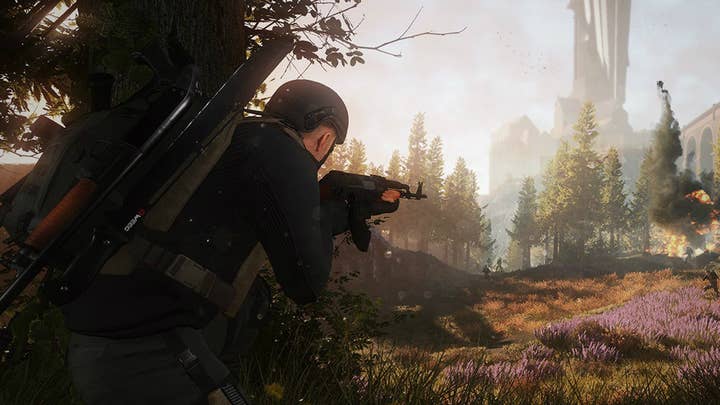Whole new worlds: Improbable's tech lets smaller studios think big
With Mavericks and Seed, Automaton and Klang Games are using SpatialOS to redefine what it means to be massively multiplayer
In April 2017, Improbable was a known quantity in the games industry, if still a little obscure. In May 2017, that all changed; a $502 million investment round, led by Softbank, put the London-based startup on the frontpage of the Financial Times, and made it one of the most talked about tech companies in the world.
Since then, Improbable has continued to make headlines for attracting investment, but less so for the games made with its valuable tech, SpatialOS. Worlds Adrift launched on Early Access in May this year, but whatever the future holds for Bossa Studios' ambitious project, the first game to test the limits of a technology rarely does so as well or as thoroughly as those that come after.
More SpatialOS games are coming, of course, and in the case of Automaton, the first stage of a game will be coming before the end of the year. Founded by a core team with roots in MMORPG pioneer Jagex, the Cambridge-based developer was created to be what CEO and CTO James Thompson describes as a "tech-focused group" with the intent of addressing a "lack of progress" in massively multiplayer games.
"Before Unreal and Unity became commonplace, only certain kinds of people built games. That hasn't changed for massively multiplayer games"
Automaton
"How we build our games is completely different," Thompson says, contrasting Automaton's methods to those of most game developers. "We think about the efficiency of building out large-scale worlds. We don't focus just on systems that make great results short-term. We think about how scalable that is if you want to do something really ambitious. That is embedded in our studio.
"When you programme in our game worlds, you have to be able to run hundreds of players on one computer and just swap between them. Concepts like this are what we build into the development teams. It means we can iterate faster, because iteration on design hasn't happened enough in MMOs."
This is evident in even the briefest pitch of Automaton's first game, Mavericks: Proving Grounds, a battle royale shooter that can support up to - wait for it - 1,000 concurrent players. A huge factor in what has allowed Automaton to take this astonishing figure as the starting point for its vision is Spatial OS, a technology that Thompson and Automaton's executive director, Mark Gerhard, were introduced to by Jagex CEO Phil Mansell when the pair left the company.

"We were initially sceptical as to what SpatialOS was all about," Thompson says. "We understand that sort of technology ourselves. We've built it ourselves, or similar technology; distributed systems, networking, MMOs, we'd worked in that space before."
However, Mavericks was an "incredibly ambitious" idea, an attempt to shift the idea of "massively multiplayer" gaming away from RPGs. Realising that goal would require both a very advanced technical infrastructure and game content that could compete directly with the most popular games of its broad type: PUBG, Destiny, Call of Duty, you name it. In providing a cost-effective solution for the former, Improbable allowed Automaton to focus more on the latter.
"We're about the games, Improbable is about the platform," Thompson summarises. "The biggest difference with SpatialOS is that, as a game developer, you can think only about entities, and workers, and space. It says just worry about this, and we'll take care of a lot of the distributed nature of the game.
"That saves us a lot of time in terms of building out the networking system heavy-lifting, which, although we've done it before, it's currently built very bespoke for a lot of different games... Anyone can build a complex system with enough time and budget. It's really about making it a lot simpler to make more ambitious games.
"Anyone can build a complex system with enough time and budget. It's really about making it a lot simpler to make more ambitious games"
Automaton
"Before Unreal and Unity, before they became commonplace, only certain kinds of people built games, in a way.... That hasn't changed for massively multiplayer games. It has been too difficult."
The ambition of Mavericks goes far beyond the 1,000 concurrent players that will compete in its biggest battle royale matches. The technical burden shouldered by SpatialOS has allowed Automaton to invest more of its time and resources into using physically-based rendering, photogrammetry and streaming technologies to create a "photo-realistic" world, and to simulate that world in a way that adds a new dimension to the moment-by-moment gameplay.
While on the surface it would appear to be a competitor to PUBG and Fortnite, Thompson mentions ARMA when discussing the detail that will be simulated in the world: displaced foliage, footprints in the mud and grass, discarded parachutes and weapon clips; all will be persistent details that players can use to their advantage in various ways.
"We're really ramping up the amount of information. If you want to play passive, if you want to hide, you can, but you'll have to work harder in order to do that. You'll have to think more about what you're doing, and you're given more information about what the other players are doing through these different information systems - through a trail, through the wildlife moving somewhere."

The persistent information will play out on an even grander scale away from Mavericks' battle royale matches, in a vast, open hub-world populated by players and the characters they create. The battle royale aspect of the game will debut in some form in 2018, Thompson says, but development of that larger world and will follow in 2019 and well beyond. It calls to mind Destiny, if the narrative context of Destiny evolved in the same manner as EVE Online.
"You have that session-based experience, but it's all fitted together in a world that has persistence," Thompson adds. "You can walk out into the open world and fight each other for your stuff if you want to, and we're developing that into a full MMORPG experience in 2019.
"Mavericks is the first game that, we think, blends together the system MMO experience with a session-based experience"
Automaton
"We see Mavericks as much as a platform as the game we can talk about today... We have the ability to have multiple game types in the world, and we have the more persistent stuff that's really going to ramp up over time and become fascinating, with faction wars and clans. We have lots of really great ideas there."
"Mavericks is an interesting step; it's the first game that, we think, blends together the system MMO experience with a session-based experience.... When it gets to launch, you'll look at it and you'll never have seen a game that does this and at this kind of scale. You'll have seen one or the other, but not both. That's what Mavericks is doing for the first time."
Automaton is pushing towards these lofty goals with a core team of under 50 people, and Thompson is open about his desire to keep the core team below 100 people even when the game is out in the wild. "You can't know that many people truly, you can't manage that," he says. "That's another part of the value of SpatialOS."
The same is true of another project being made with Improbable's tech, and arguably the most intriguing one of all: Seed, from the Berlin-based studio Klang Games.

The idea itself dates back more than a decade, in a series of conversations between Klang's three Icelandic co-founders. "What would be the ultimate game for a truly emergent sandbox MMO?" says Mundi Vondi, one of the studio's founders and its current CEO. "How do you do that? What are the problems?"
At the time, Klang's two other founders, CCO Ívar Emilsson and CTO Oddur Snær Magnússon, both worked at CCP Games, a specialist in the field. Vondi admits that the conversations were purely speculative - three friends together, daydreaming about the future - but over the next five years the idea started to take shape, and the desire to make it a reality became impossible to shake.
Klang was established in 2013, with the goal of making what would become Seed. Even its debut release, the excellent mobile game ReRunners, was primarily about establishing the studio's reputation to help make the case for funding Seed, or simply funding Seed through the money it made. Ultimately, it proved to be the former, but Improbable was an essential force in making it all come together.
"Oddur, our CTO, was the lead engineer on the EVE server cluster, so probably one of the most knowledgeable people on trying to build something where you need to stitch together many servers," Vondi says. "EVE was - and probably still is - the only running game that has stitched together multiple servers, and that's what Improbable is doing."
"EVE was the only running game that has stitched together multiple servers, and that's what Improbable is doing"
This knowledge led to Klang being asked to do "due diligence" on Improbable ahead of its $20 million investment round in March 2015, when it became immediately clear that SpatialOS and Seed could be an ideal fit. Subsequently, Klang rented out some of its office space to CoreOS, a technology used in the SpatialOS platform, which resulted in frequent visits from Improbable's engineers.
"We used to talk things through, and really try to evaluate if what they were talking about was real," Vondi says. "At the time it was a grey area. It's super ambitious, it's difficult to do, and originally we wanted to do a custom solution [for Seed] ourselves.
"But after a lot of talking we really figured out that this was going to work beautifully... Improbable demoed to us a city, where they had a million residents and they were simulating each one of them. We were like, 'okay, that's pretty close.'"
Seed defies easy description, but the goal is to create a persistent simulation in which players can participate in and create human societies. Each player will control a group of characters that Vondi describes as "a family," the members of which have distinct traits, skills and emotional responses. These qualities can change over time based on their experiences, trending towards negative or positive.
"Over a longer time the character's psyche can be drained down to a critical level, and that's when they can start being something like an alcoholic or depressed," says Vondi. "And that will have a cascading effect. They can be going around and insulting people, and draining the mood of the entire colony. It's a butterfly effect."
This is only one way of experiencing the game; supervising a small group of characters, who will continue to exist even when the computer is off and your attention is elsewhere. But in Seed, every small group of characters is controlled by a real player, and all of them exist in the same world at the same time. The grander ambition for Seed is that, much like EVE Online, those players will self-organise into colonies, and use tools created by Klang that allow them to create systems of government and voting, to set a constitution, to implement and enforce laws and, if there is unrest, to overthrow that structure and start again.
"What we are trying to achieve here is simulating millions of characters"
Klang Games
"One of the big learnings from EVE is that, when players started to form alliances, they had a hard limit to how big they could grow," says Vondi. "Self-organising became too cumbersome. By adding tools these communities grew much larger, and they started to see 1,000 players together, 4,000 players together, and even more. We're working hard to come up with the next level of these tools."
We saw early versions of Klang's tools for creating systems of government and laws; modular processes that were seemed both malleable and entirely convincing. Seed will allow players to craft myriad spins on representative democracy, dictatorship, communist collective, monarchy, or entirely bespoke mixtures of different laws and processes.
"Let the player decide," Vondi posits. "'I'm going to have three kings. They decide everything, but each one only lasts for a year'... It is a challenge for the player to come up with a system that gives enough power to control, but at the same time is convincing enough for the rest of the players in the community to approve of it.
"We want everything in Seed to be actual, and driven by purpose. There will be role-playing like, 'I am the president', but they actually will have the power to say and do stuff that reinforces that they actually are a powerful entity in the game."

Seed is as ambitious an idea as one can find in the games industry today, and while Klang will do brilliantly to deliver on every one of its targets, it is certainly tackling them in the right way. The company has MIT Media Lab director Joi Ito among its investors and advisors, and it works closely with the noted legal academic and activist Lawrence Lessig on developing the systems that will allow Seed to be used, "as a platform for testing government systems."
Much like Automaton, Klang arrived at the idea for Seed through the fundamental desire to push the idea of the MMO in a new direction. "The MMO space has lacked innovation, due to the incredibly high development cost of trying to build your back-end, and scaling a gaming system for that amount of players," Vondi says. "Once you lower the cost of that development, you open up a new era of innovation in that entire space."
"It would have been at least two years with highly expensive engineers without SpatialOS, and who knows if we would have succeeded?"
Klang Games
This is what Improbable has done for Klang, taking enough risk out of working on the scale of an MMO to allow more deviation from the WoW template, and allowing small, creative teams to drive that change. According to Vondi, the availability of SpatialOS brought forward Klang's plans for Seed by several years.
"Oh yeah, way further [in the future]," he says. "We would have had to spend at least two years just building out the back-end. It would have been more specialised just towards what we were trying to do, but it wouldn't have been anywhere near the complexity of Improbable's back-end. It would have been at least two years with highly expensive engineers, and who knows if we would have succeeded?
"What we are trying to achieve here is simulating millions of characters, so we're optimising from the very get go... It's very impressive, what the technology is capable of doing, and the promise is that we will be able to put all of the players on a single planet."
Both Mavericks and Seed are intriguing in their own right, but each in an entirely distinct way. However, with games like PUBG and Destiny as reference points, it's difficult not to see Klang's Seed as the more exciting demonstration of what off-the-shelf tech like SpatialOS could allow developers to explore. As Vondi points out, Klang's biggest single inspiration is The Sims - "a completely overlooked area in gaming," the full implications of which would never have been explored by a publisher like EA.
But for a 40-person indie studio in Berlin using Improbable's technology, suddenly the possibilities have changed.
"I know there's going to be a bigger shooter, with like 400 players, and that is going to be awesome," says Vondi. "But that isn't the evolution of gaming; that's more gamers doing a similar thing. What are going to be the games that actually benefits from all of the players playing? Not just 400 people - everyone.
"To me, it's very obvious that this is the future of games."



.jpg?width=291&height=164&fit=crop&quality=80&format=jpg&auto=webp)





